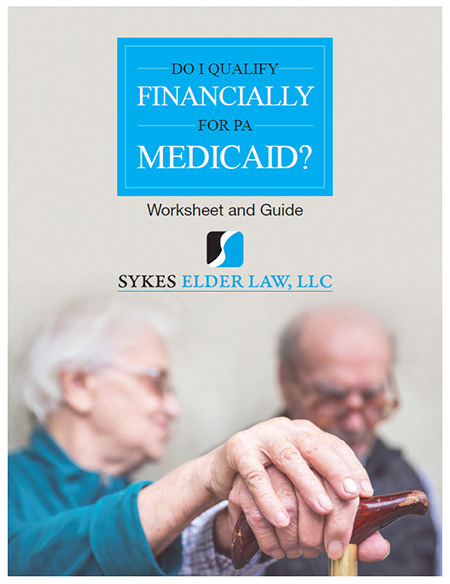Imagine that your husband recently suffered a stroke. After a stay in the hospital, he now resides in a nursing home. His doctor tells you your husband will not likely improve and will need to stay at the home indefinitely.
You worry how you will pay for care at $10,000 a month without impoverishing yourself.
A friend suggests you speak with an elder law attorney to come up with a plan. But the friendly, helpful woman in the nursing home’s business office dismisses that suggestion with a wave of her hand. “You don’t need to do that, we’ll help you prepare a Medicaid application – and we’ll do it for free!”
She seems so knowledgeable, telling you with certainty that the rules allow you to keep your house but require you to spend down half your other assets. “Well,” you think to yourself, “money is tight right now. Why pay someone to help me when the rules are clear and the nursing home will help me file an application for free?”
The answer is that you could easily wind up spending tens of thousands or even hundreds of thousands of dollars unnecessarily without a good plan to qualify for benefits.
Hopefully that last sentence got your attention. I’ve seen it happen countless times. A client finally comes to me for help a year or two too late, only to discover that they have been writing large checks for nursing care every month, when they could qualified for benefits long ago. Too late now – the money’s gone.
I don’t want you to end up like that. Read on to find out why it’s important to get good, objective advice, and how you can get that advice easily.
1. Qualifying for Medicaid is not simply a matter of filing an application.
Let me repeat that: Qualifying for Medicaid is not simply a matter of filing an application.
A nursing home resident becomes eligible to receive Medicaid benefits only after meeting certain financial requirements. You will not receive a dime in benefits until you meet those requirements.
The application merely allows benefits to begin once you have already met the requirements. A few people (those with very few assets) qualify immediately. Others have so much in assets that they will never qualify.
But most middle class clients we have seen must first spend down some assets before becoming qualified for benefits. Filing an application makes sense only when you have made the requisite spend-down.
Ideally, you should have a plan for how you will become qualified.
2. Medicaid rules allow numerous opportunities for savings and asset protection.
Medicaid law allows applicants to claim certain assets as “exempt,” meaning they will not count for spend-down purposes. The law also permits some “exempt transfers” of assets (for example, the transfer of a house to a caregiver child) that will help an applicant become eligible without triggering the usual penalty for giving away assets.
For married couples, the rules become more complex, allowing the non-applicant spouse (the “community spouse”) to keep some of the couple’s assets as a “community spouse resource allowance,” permitting the community spouse to receive a certain level of income as a monthly maintenance needs allowance, and allowing the community spouse to keep additional assets if income is needed for the community spouse to receive an adequate needs allowance.
In addition, case law in Pennsylvania authorizes the purchase of an annuity to give the community spouse additional income.
Let me stop here for a moment and return to the example I started with. Is the nursing home business manager (who offered to help you fill out an application) going to sit down with you and calculate your community spouse resource allowance and your monthly maintenance needs allowance to determine if you are entitled to keep additional assets when qualifying for benefits, or to discuss whether the purchase of an annuity would help you qualify sooner and provide income you will need in the future?
My guess is almost certainly not – she lacks the knowledge, training, and time to make those calculations and assessments.
3. Lawyers are trained to serve your best interests.
An experienced elder law attorney (especially one with a CELA designation) has the training to look for all the various ways you can get the best financial result.
And unlike someone who works for a nursing home, your lawyer has no conflict of interest. Keep in mind that the nursing home has an interest in making sure you qualify for benefits when you’ve spent down, but not necessarily in having you qualify any sooner. After all, the nursing home makes more profit when you’re spending down than when you’ve qualified for benefits.
A lawyer, on the other hand, is trained (and required by the rules of professional conduct) to act only in your best interest.
In the case of Medicaid planning, that means finding the spend-down scenario that will best serve your interests in saving money, protecting assets, and providing for the security of the community spouse.
A good elder law attorney will have spent significant time learning the nuances of Medicaid law and accumulating an assortment of techniques to maximize asset protection for clients. This knowledge and expertise can prove invaluable in crafting your plan.
4. We make it easy to find out if hiring an attorney is cost-effective.
At Sykes Elder Law, we make it simple to determine if using an attorney for Medicaid planning makes sense in your case.
When you first call, you will speak to someone who is trained to ask you the right questions to find out if it makes sense to come in for an appointment. We make appointments only for those clients who appear to be good candidates for benefitting from our expertise. If we believe you would not benefit, we tell you; if we believe you would benefit, we recommend an appointment with a certified elder law attorney.
It costs just $385 (at the time of this writing) to have an attorney meet with you, review your circumstances in detail, and make recommendations on how to proceed. Some clients receive great benefit (mentally and financially) from just that one meeting. In many cases, though, clients decide to hire us to help them design and implement a Medicaid qualification and asset protection plan because they have discovered how much more they will save and protect by having professional help.
Worth a phone call?
Let’s go back to the question from earlier in this post: Is it worth it to pay someone to help me, when I could prepare an application myself or get free help from someone at the nursing home?
It may or may not be cost-effective to hire an elder law attorney for Medicaid planning, depending on your situation. But it takes one phone call to start finding out.






